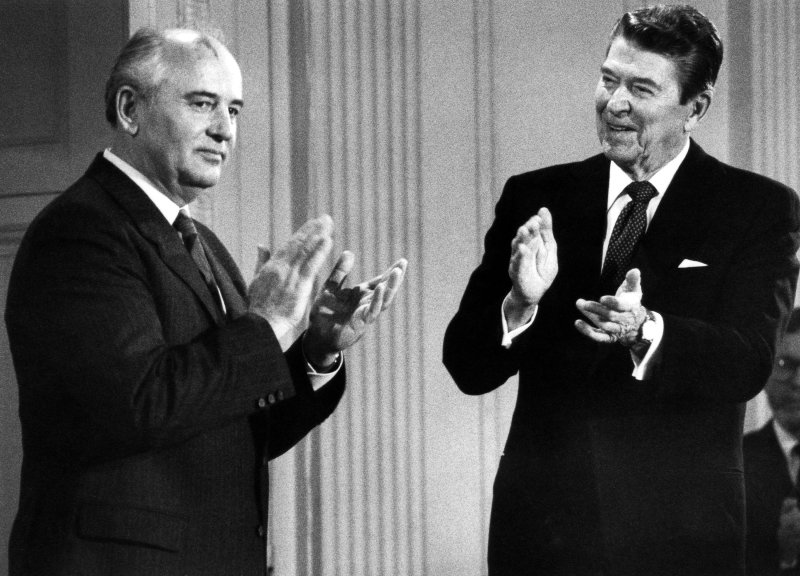1 of 2 | President Ronald Reagan and Soviet leader Mikhail Gorbachev applaud after signing the historic arms control agreement banning intermediate-range nuclear missiles in the East Room of the White House December 8, 1987. (UPI Photos/FILES) |
License Photo
WASHINGTON, Sept. 30 (UPI) -- On March 23, 1983, in a speech to the nation announcing the Strategic Defense Initiative, U.S. President Ronald Reagan pledged to make "nuclear weapons impotent and obsolete." The left immediately attacked Reagan and his initiative was ridiculed as "Star Wars." Ironically, President Barack Obama is on his way to making good on Reagan's pledge. And for that, he is being roundly criticized by the far right.
Last week Obama sensibly reset the missile defense plans to station 10 interceptors and ground based radar in Poland and the Czech Republic against the threat of Iranian intercontinental ballistic missiles that may never be built. In his U.N. General Assembly speech on Wednesday, Obama renewed his call for a nuclear weapons free world and vowed that he would pursue genuine nuclear arms reductions with Russia and finally have the Senate approve the Comprehensive Test Ban Treaty and other measures. These steps surely were aimed at moving nuclear weapons towards Reagan's famous promise of impotence and obsolescence. Another critical step is needed, and we will return to that shortly.
Any military commander worth his or her salt will readily agree that tactical defense against ballistic and cruise missiles is essential. Given the geography of the two states of concern -- North Korea and Iran -- tactical or regional defenses needed by militaries applies to defending against the shorter-range missiles possessed by Tehran and Pyongyang. More to the point, as the Standard Missile Block Three becomes operational in the next five or so years, it has the capacity for ascent or boost-phase intercept -- that is, knocking the missile down while it is going up and before it can deploy any defenses. And the timing conforms to estimates of when North Korea and Iran might be able to acquire longer-range missiles.
Furthermore, as ascent-phased interceptors become operational, there is no reason the technology could not be made available to neighbors of these two states of concern including China and Russia. The effect would surely be to make Iranian and North Korean missiles "impotent and obsolete." And the ability to station these SM-3s at sea eliminates any problems of shore basing and national sovereignty.
Regarding the commitment to arms control, arms reductions and preventing the proliferation of nuclear fissile material and weapons, the United States had no choice except to take the high road and finally begin complying with the 40-year-old Non-Proliferation Treaty in which the nuclear weapons states were to make a good-faith effort to reduce those arms. This may work. Rationality and strategic logic are not always sufficient to overcome politics -- particularly in the Senate. And the right wing will have field days accusing the Obama administration of appeasement and unilateral disarmament.
So far, the administration has not sketched out or issued an overarching vision or statement of its strategic intent. And the shift away from the Ground Base Interceptor system in Europe was not rolled out smoothly for reasons that are still unclear. But given the new focus of missile defense and the president's U.N. speech, it is very clear where the administration wishes to go.
The missing element relates to proliferation. For the time being, as neither sanctions nor incentives convinced North Korea to halt its nuclear weapons program and are unlikely to do the same in Iran if the mullahs are determined to build an A-bomb, only military action can offers a means -- and an extraordinarily risky one -- of prevention. Yet, there is a surer option. Control the nuclear fuel cycle!
If guaranteed permanent access to nuclear fuel, states need not enrich. Furthermore, given nearly half a million metric tons of nuclear waste that must be stored, control of the fuel cycle could solve both the problems of proliferation and storage. Interestingly, a decade ago Russia approved a law that permitted storage of nuclear waste, at a price, within its borders. That approval has not been exploited.
Whether through an international organization such as the IAEA or competitive fuel recycling combines, provided guarantees could be made and honored, this approach offers a means to combat proliferation by applying better controls to the fuel cycle. And surely other states might find the incentives of storing nuclear waste sufficient to offer sites. That will not be easy given the U.S. impasse over Yucca Mountain and the resistance of Nevadans to accept the storage site planned for their state.
The notion of a nuclear weapons free world may prove to be utopian and therefore unobtainable. However, in the process of moving in that direction, while the Obama presidency may never make nuclear weapons "impotent and obsolete," it can greatly reduce the chances of one being used in anger. Ronald Reagan will be proud and the right will fume.
--
(Harlan Ullman is chairman of the Killowen Group that advises leaders of government and business.)
--
(United Press International's "Outside View" commentaries are written by outside contributors who specialize in a variety of important issues. The views expressed do not necessarily reflect those of United Press International. In the interests of creating an open forum, original submissions are invited.)















